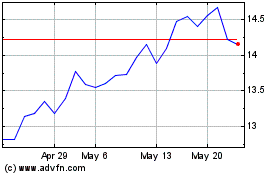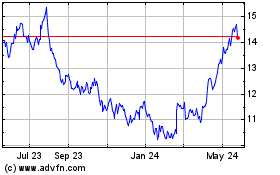Stock Selloff Hits Limits as Investors Undo Bets
09 November 2016 - 7:10PM
Dow Jones News
U.S. stock futures plunged overnight as early election results
showed Republican presidential nominee Donald Trump leading in
several key states.
E-mini S&P 500 futures fell 5% around midnight Eastern Time,
hitting a limit designed to halt further drops, before recently
paring losses to 4.1%. Equities futures are limited to a 5% loss or
gain during overnight trading, CME Group Inc. spokeswoman Alex
Gorbokon said. The last time stock-market futures fell 5% in
after-hours trading was in the aftermath of Brexit on June 23.
Investors were once again caught off guard late Tuesday.
The S&P 500 jumped 2.2% on Monday—its biggest gain since
March—and rose another 0.4% on Tuesday as investors and traders
appeared more confident about a victory for Democratic presidential
candidate Hillary Clinton. That came after the index posted nine
consecutive sessions of losses through the end of last week as
polls tightened.
"Monday and Tuesday, the assumption was Clinton would take the
election in a cakewalk. Based on what we see right now, that
assumption is wrong," said Jack Ablin, chief investment officer at
wealth manager BMO Private Bank.
Mr. Ablin added that this selloff "isn't an emotional avalanche,
this is simply a rational unwinding of a fallacious assumption."
Still, if Mr. Trump wins, he said, there could be a steep selloff
on Wednesday.
Stocks in Asia tumbled, with Japan's Nikkei Stock Average losing
5.4% and Hong Kong's Hang Seng falling 2.9%.
Dow Jones Industrial Average futures dropped 700 points, or
3.8%, to 17585. The last time the Dow closed below 17600 was June
28, five days after the U.K. voted to leave the European Union.
Changes in stock futures don't always accurately predict moves in
the stock market after the opening bell.
Several investors and analysts had cited Brexit as a reason to
be cautious heading into the U.S. election. The S&P 500 rose
1.3% on June 23, before the results came out, then tumbled more
than 5% over the following two trading sessions. However, stocks
recovered and rose to new highs over the summer.
With clients texting and asking what they should do as the U.S.
results were announced, David Kotok, chief investment officer at
Cumberland Advisors, had one piece of advice: "I say to them, 'You
should probably get some sleep.'"
Some said the market was overreacting—that the race remained
close and selling was likely to be short-lived.
"Everyone wants to be the first to panic, not the last," said
Brian Jacobsen, chief portfolio strategist at Wells Fargo Funds
Management.
Ryan Wibberley, chief executive of Gaithersburg, Md.-based CIC
Wealth, said that if the Dow Jones Industrial Average opened down
700 points on Wednesday morning, his firm would probably be buying
on Wednesday, no matter who wins the presidential election. "I just
think regardless, I'm not surprised the market is down, but I don't
think it's going to hold for more than a week."
"There'll be good deals," he added, paused, and said, "I don't
know what yet."
Write to Corrie Driebusch at corrie.driebusch@wsj.com, Aaron
Kuriloff at aaron.kuriloff@wsj.com and Akane Otani at
akane.otani@wsj.com
(END) Dow Jones Newswires
November 09, 2016 02:55 ET (07:55 GMT)
Copyright (c) 2016 Dow Jones & Company, Inc.
Hang Seng Bank (PK) (USOTC:HSNGY)
Historical Stock Chart
From Nov 2024 to Dec 2024

Hang Seng Bank (PK) (USOTC:HSNGY)
Historical Stock Chart
From Dec 2023 to Dec 2024
